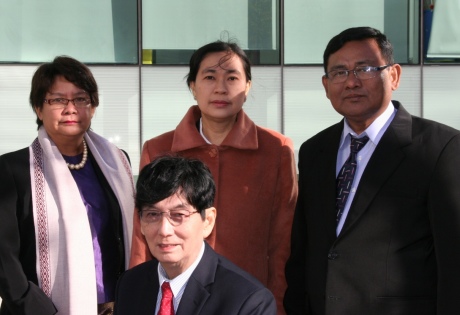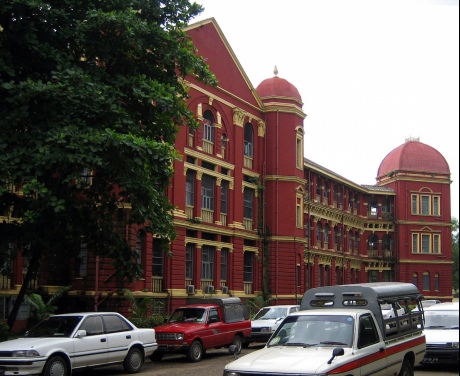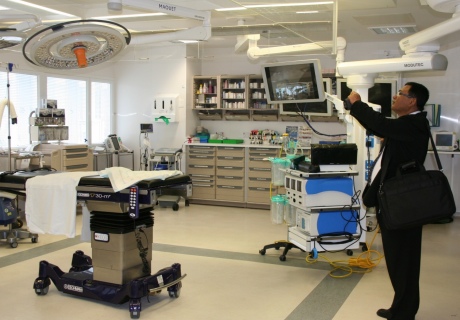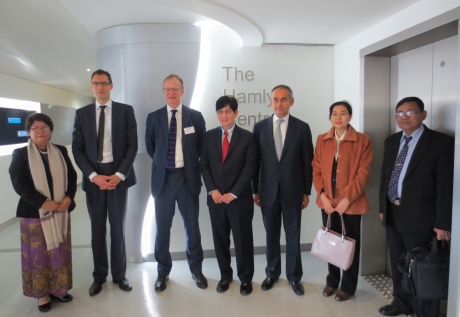IGHI welcomes Burmese Health Delegation
by Jo Seed

IGHI hosts a reception to welcome Burmese health delegation to UK
IGHI welcomed delegates from Burma’s healthcare system who are visiting London this week to discuss their plans for the upgrade of Yangon General Hospital and wider healthcare reform in the country.
The visit follows an initial meeting in Burma last year between Professor Lord Ara Darzi and the country’s opposition leader Aung San Suu Kyi.
 The delegation included Member of Hluttaw (Parliament), Mr Kyaw Myint, Senior Registered Architect, Ms Nilar Kyaw, Deputy Medical Superintendent, Ms Myint Myint Aye and Deputy Nursing Superintendent, Mr San Kyi.
The delegation included Member of Hluttaw (Parliament), Mr Kyaw Myint, Senior Registered Architect, Ms Nilar Kyaw, Deputy Medical Superintendent, Ms Myint Myint Aye and Deputy Nursing Superintendent, Mr San Kyi.
In addition to IGHI the delegation are also visiting the House of Lords, 10 Downing St, the Department for International Development (DFID) and new-build and Victorian style NHS hospitals in London to learn about the UK health system.
While recent political reforms in Burma show promise for the country’s future, Burma’s healthcare system faces a number of challenges before it can deliver effective and affordable care to its people.
After discussion, it became clear that the main challenges facing healthcare in Burma were surrounding:
Infrastructure and policy
Yangon General Hospital

The hospital renovation project forms part of a large push from local government to reform Burma’s health system. The government spent less than $1 per person on healthcare in 2007, according to the Health Ministry. This has led to a huge downfall in infrastructure across all aspects of healthcare in Burma such as access to the drugs and the proximity of healthcare availability to villages.
The majority of Burma’s population live in rural areas, but most health services are concentrated in larger towns or cities. A 2012 report by the Myanmar Ministry of Health reported that the number of rural health centres has increased from 1,337 to 1,565 since 1988, but the Ministry of Health has ambitious plans for further expansion.
By visiting the House of Lords, 10 Downing St and DFID, the delegation was able to gain an in-depth understanding of how health policy works in the UK. Going forward, they hope to put what they have learnt into practice during the Yangon hospital renovation project. This can then be scaled up to transform hospitals and improve infrastructure throughout Burma.
Drug availability
Patients in Burma claim many rural health centres lack basic supplies, medication, and equipment. Patients frequently have to travel great distances, mainly to cities like Yangon, in order to find treatment that is unaffordable or unavailable in their own village or town. This is a particular worry for patients with complex medical conditions such as diabetes or cancer who need more around the clock care. In some cases, even at facilities in the cities that do offer care, treatment continues to be cost-prohibitive.
The Burmese delegation sought advice from clinicians and economists within IGHI to get a better understanding of drug provision in the NHS.
Human resources
 In rural areas, most healthcare is given by either health assistants, midwives or local healers. They are often overworked as there is not enough resource to cover the demand and so patients are not receiving the optimum level of care. The delegation also visited a number of NHS hospitals and trusts in London including the Royal Marsden, Chelsea and Westminster and St Mary’s Hospital in Paddington, Public Health England (PHE) and the Central and North West London Trust were they were given a 360 view of the NHS and how their HR provision is structured.
In rural areas, most healthcare is given by either health assistants, midwives or local healers. They are often overworked as there is not enough resource to cover the demand and so patients are not receiving the optimum level of care. The delegation also visited a number of NHS hospitals and trusts in London including the Royal Marsden, Chelsea and Westminster and St Mary’s Hospital in Paddington, Public Health England (PHE) and the Central and North West London Trust were they were given a 360 view of the NHS and how their HR provision is structured.
Learning from each other
Learning together and setting up HR systems that work for patients and health workers alike will help make the much needed improvements to healthcare in Burma.
Professor the Lord Ara Darzi, Director of IGHI, said: “Building a building is easy. To make a hospital work, you need to have good staff with the right training and resources, and good systems to enable them to provide quality care. The UK has many examples of successfully transforming Victorian buildings into modern hospitals that offer truly world-class and innovative services for their populations, which we think Burma can learn from."
The reinvigoration of Yangon General Hospital is a symbol of our country’s health affairs and its reinvigoration is the most important step in upgrading our country’s health status.
– Ms Nilar Kyaw
Senior Registered Architect from the hospital Transformation team
Senior Registered Architect from the hospital Transformation team Ms Nilar Kyaw said: “The reinvigoration of Yangon General Hospital is not just about building a hospital. It is a symbol of our country’s health affairs and its reinvigoration is the most important step in upgrading our country’s health status. We are so passionate about getting it right because the building is in the hearts of the people of Burma. Its redevelopment will be a signal to the people that there is hope, investment and reinvigoration in the whole community of Yangon. It might be a hospital to some, but to the Burmese people, it is a symbol of our culture and history”

Article text (excluding photos or graphics) © Imperial College London.
Photos and graphics subject to third party copyright used with permission or © Imperial College London.
Reporter
Jo Seed
Institute of Global Health Innovation